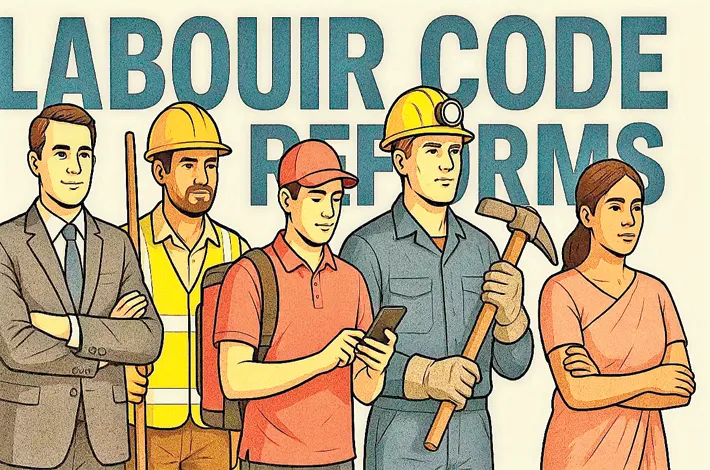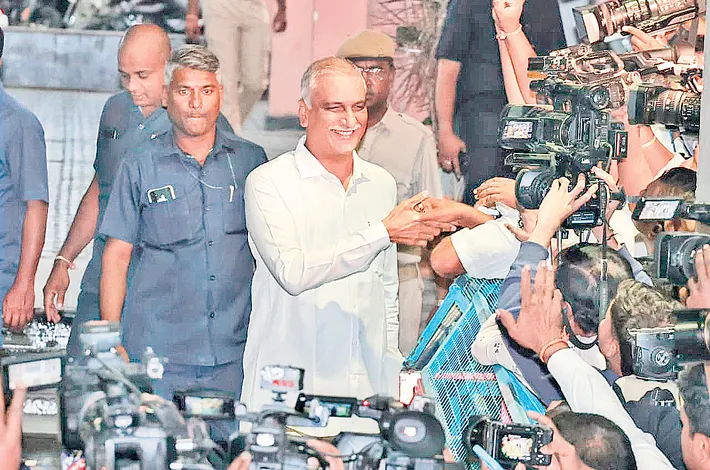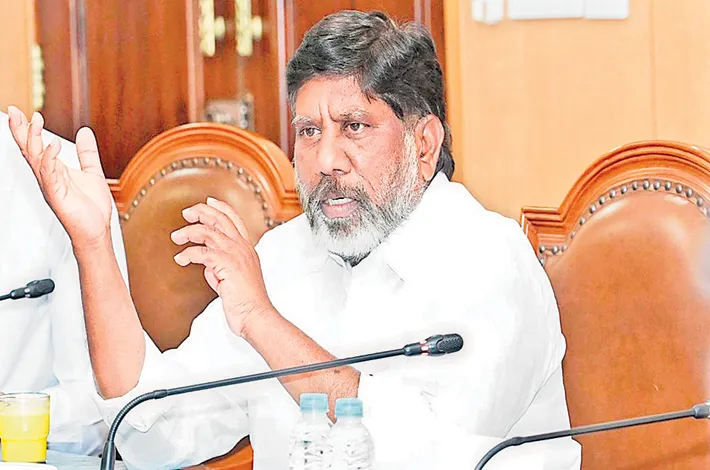New labor codes : Benefit to deserving or mere lip service?
25-11-2025 12:00:00 AM

In one of the most significant overhauls of labor laws, the Centre has officially enforced four new labor codes starting 21 November 2025. These codes — the Code on Wages 2019, Industrial Relations Code 2020, Code on Social Security 2020, and Occupational Safety, Health and Working Conditions Code 2020 — replace 29 existing labor laws passed by Parliament in 2020.
Prime Minister Narendra Modi hailed the move as a “landmark reform” that will modernize labor governance, enhance transparency, and provide universal social security, especially to India’s growing gig and platform workforce. Experts describe the consolidation of 29 laws into four as a “one nation, one law” approach that significantly eases doing business while expanding worker protections.
In stark contrast, the opposition has mobilized swift condemnation, portraying the codes as a betrayal of workers' rights amid the government's post-Bihar election "super empowerment. "A Congress spokesperson slammed the reforms as "anti-worker and corporate-friendly," alleging they strip away decades of hard-earned protections, dismantle job security, and leave over 90% of the unorganized workforce in vulnerability.
The reforms introduce several worker-friendly measures. Gig and platform workers, previously excluded from most social security nets, will now be covered under schemes offering provident fund, insurance, pension, and other benefits. Aggregators (such as ride-hailing and delivery platforms) will be required to contribute 1–2% of their annual turnover to a dedicated welfare fund.
Other key provisions include mandatory written appointment letters, guaranteed minimum wages (with equal pay for men and women), timely wage disbursement, free annual health check-ups for workers above 40, and extension of gratuity and other benefits to fixed-term employees on par with permanent staff.
Previously, several private-sector employees – especially in high-attrition sectors such as IT, retail, startups, and the gig economy – lost their entire gratuity entitlement simply because they changed jobs before completing five years with the same employer. Under the amended rules, any employee who has completed at least one year of continuous service will now be eligible for the lump-sum benefit upon resignation, termination, retirement, superannuation, disablement, or (in case of death) to their nominees.
Trade unions have strongly opposed the new labor codes branding them a "deceptive fraud" and "declaration of war" on workers' rights. Representing tens of millions of laborers, a coalition of ten major central trade unions (CTUs)—including the All India Trade Union Congress (AITUC), Centre of Indian Trade Unions (CITU), Hind Mazdoor Sabha (HMS), Indian National Trade Union Congress (INTUC), and others—issued a joint statement late Friday, demanding immediate withdrawal of the codes. They accuse the Modi government of a "blatantly unilateral" rollout that ignored years of consultations, protests and strikes, favoring "employer representatives and fringe supporters" over genuine labor voices.
The main opposition of the unions comes from provisions they view as eroding core protections, such as easing hiring and firing (now allowed without government approval for firms with up to 299 workers, up from 100), extending shifts to 12 hours, and mandating night shifts for women in hazardous sectors. A senior AITUC leader decried the codes as "snatching workers’ rights, including fixed-term jobs and safeguards under earlier laws." Similarly, a CITU leader termed the reforms a ploy to create a "trade union-free atmosphere," and noted that states like Kerala are unlikely to notify supporting rules, potentially delaying enforcement.
At the same time, the labor front is not homogeneous. At least 14 national unions, including the RSS-affiliated Bharatiya Mazdoor Sangh (BMS)—India's largest with over 10 million members—and the National Front of Indian Trade Unions (NFITU), have welcomed the codes as "worker-centric and progressive." In Guwahati, an NFITU leader praised the new laws as a "boon" for unorganized and gig workers, citing benefits like timely minimum wages, mandatory appointment letters, equal pay for women, enhanced maternity benefits, and a dedicated social security fund.
BMS urged states to implement after consultations, viewing the consolidation of 29 laws as a step toward formalization and safety. This split highlights ideological divides: pro-government unions emphasize expanded coverage (from 19% in 2015 to 64% now), while critics fear diluted bargaining power and vulnerability for the 90% unorganized workforce.
Major industry associations have been vocal in their support. The Confederation of Indian Industry (CII), a key business lobby, hailed the rollout as a "historic milestone for India's labor landscape," with Director General Chandrajit Banerjee emphasizing that the consolidation represents a "transformative leap toward a modern, simplified, and future-ready labor ecosystem." Similarly, NASSCOM, representing the IT-BPM sector, described the codes as "a step toward greater predictability and transparency," underscoring their potential to standardize employment terms for contractual and fixed-term workers while urging alignment with state-level laws for seamless adoption.
A senior executive of a tax and business consultancy firm called the inclusion of gig workers under social security “transformational” and noted that India is now “a step ahead” of many developed nations in protecting platform workers. He emphasized that a new uniform wage definition will increase long-term benefits like gratuity (now calculated on basic pay plus most allowances), though it may marginally affect short-term take-home salary in some cases.
He stressed that the most revolutionary aspect is “social security for all” — covering traditional employees, contract labor, fixed-term staff, and gig workers under a common framework. Arvind Panagariya, Chairman of the 16th Finance Commission and a Modi-era advisor, dubbed the codes the "mother of all reforms," arguing they dismantle "rigid, job-stifling rules" that trapped workers in low-productivity sectors and stifled factory jobs. This view resonates with NDA's push for global competitiveness
Yet, not all reactions from industry circles are unqualified cheers. Smaller firms, particularly MSMEs, have raised alarms about escalating costs from mandated contributions to welfare funds (1-2% of turnover for aggregators) and expanded social security obligations, which could strain thin margins and disrupt sector continuity. The Association of Indian Entrepreneurs warned that the new structure might "significantly increase operating costs" for these entities, potentially pushing some informal operations further underground.
Implementation, however, hinges on state governments notifying operational rules. While the central codes are now in force, many states have only issued draft rules so far. The Ministry of Labor has assured consultations with industry to ensure smooth rollout, and existing rules will continue until new ones are notified.








